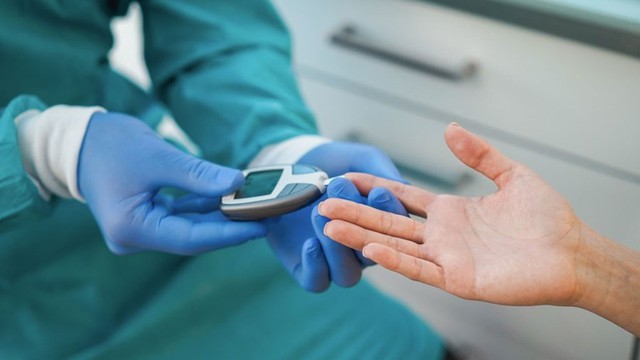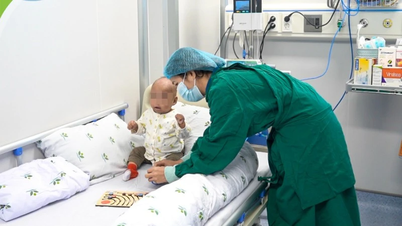If in the past many people thought that diabetes only occurred in the elderly, but now the age of diabetes is showing signs of getting younger.
Diabetes, also known as diabetes mellitus, is a very common group of internal medical diseases caused by insulin metabolism disorders in the body, leading to high blood sugar levels.

Illustration photo
According to medical experts, a person is considered to have hyperglycemia when blood sugar levels are above 5.6 mmol/l. If blood sugar levels are regularly between ~ 5.6 - ~ 7 mmol/l, it is considered pre-diabetes. If it exceeds 7mmol/l and HbA1C ≥ 6.5 mmol.l, the patient may have diabetes.
Common causes of high blood sugar are unhealthy diet, overeating, lack of exercise or emotional stress... especially after each Tet holiday, when diet and lifestyle are disrupted.
Diabetes if not detected and treated early will leave many health consequences.
3 early warning signs of diabetes
Frequent urination
Frequent urination or a higher volume of urine than usual is the first recognized symptom of diabetes. When blood sugar levels rise, compounds called ketones can develop in the body. To check for ketone levels, you can use a urine test strip at home.

Illustration photo
Constantly feeling hungry and thirsty
Feeling hungry and thirsty all the time for no apparent reason can be a sign of high blood sugar. This is often the first symptom of diabetic ketoacidosis. In severe cases, diabetic ketoacidosis can develop rapidly. For people with diabetes who do not know they have the disease, symptoms such as hunger and thirst can be serious warning signs that require careful medical evaluation.
Eyes blurred and sleepy
Blurred vision can occur as a symptom of high blood sugar. People with undiagnosed diabetes often feel tired. Many also experience unexplained weight loss and nausea...
6 things to do to stabilize blood sugar
According to medical experts, not only diabetics, but also healthy people need to follow dietary principles to reduce negative impacts on health.
Don't skip meals
Skipping meals or eating too much can have a negative impact on blood sugar. Because if you are too hungry, it can easily cause hypoglycemia. Then, when you eat too much, your blood sugar will spike. Both of these conditions are dangerous for your health. Therefore, people with diabetes need to maintain their daily routine and eating habits as usual, not skipping meals or eating too much.

Illustration photo
No starch
Sometimes diabetics are afraid of increasing blood sugar levels and do not dare to eat rice, banh chung, and completely avoid starch. However, for diabetics, starch is very important and should not be omitted. Patients must still maintain a sufficient amount of starch each day to avoid hypoglycemia.
Limit fried foods
Stir-fried, fried, grilled, and grilled dishes that use a lot of oil are often very attractive and delicious. Some stir-fried dishes or dishes that use offal easily increase blood cholesterol levels. Therefore, people with diabetes still need to maintain the amount and choice of protein as advised: balance between animal and plant protein, prioritize the use of protein in the following order: seafood, poultry, livestock...
Limit sweets and alcohol
During Tet, people tend to consume too much sugar from candies, soft drinks, dried fruits, alcohol, etc. This is one of the causes of increased blood sugar in people with diabetes.
To stabilize blood sugar, you should eat bland, boiled foods, use less dipping sauce, limit the use of pickled vegetables, pickled eggplants, and processed foods.
Eat lots of fiber
Vegetables and fruits are a food group that provides vitamins, minerals and fiber - a group of substances important for health. You should eat vegetables first, because fiber and water will help control blood sugar better.
Additionally, it is important to drink enough water to help transport nutrients, eliminate waste, and help metabolize fat.
Do exercise
Diabetics need to maintain time to exercise. It does not have to be complicated exercises, it can be walking, cycling, yoga... about 30-60 minutes/day, regularly doing 5 days/week.
Source


![[Photo] Prime Minister Pham Minh Chinh chairs meeting to deploy overcoming consequences of storm No. 10](https://vphoto.vietnam.vn/thumb/1200x675/vietnam/resource/IMAGE/2025/10/3/544f420dcc844463898fcbef46247d16)

![[Photo] Students of Binh Minh Primary School enjoy the full moon festival, receiving the joys of childhood](https://vphoto.vietnam.vn/thumb/1200x675/vietnam/resource/IMAGE/2025/10/3/8cf8abef22fe4471be400a818912cb85)

































































































Comment (0)